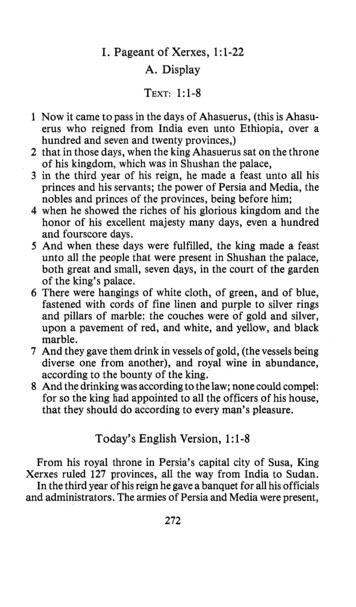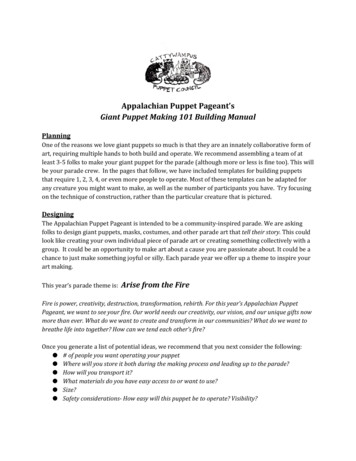
Transcription
I. Pageant of Xerxes, 1:l-22A. DisplayTEXT:1:l-81 Now it came to pass in the days of Ahasuerus, (this is Ahasuerus who reigned from India even unto Ethiopia, over ahundred and seven and twenty provinces,)2 that in those days, when the king Ahasuerus sat on the throneof his kingdom, which was in Shushan the palace,3 in the third year of his reign, he made a feast unto all hisprinces and his servants; the power of Persia and Media, thenobles and princes of the provinces, being before him;4 when he showed the riches of his glorious kingdom and thehonor of his excellent majesty many days, even a hundredand fourscore days.5 And when these days were fulfilled, the king made a feastunto all the people that were present in Shushan the palace,both great and small, seven days, in the court of the gardenof the king’s palace.6 There were hangings of white cloth, of green, and of blue,fastened with cords of fine linen and purple to silver ringsand pillars of marble: the couches were of gold and silver,upon a pavement of red, and white, and yellow, and blackmarble.7 And they gave them drink in vessels of gold, (the vessels beingdiverse one from another), and royal wine in abundance,according to the bounty of the king.8 And the drinking was according to the law; none could compel:for so the king had appointed to all the officers of his house,that they should do according to every man’s pleasure.Today’s English Version, 1:1-8From his royal throne in Persia’s capital city of Susa, KingXerxes ruled 127 provinces, all the way from India to Sudan.In the third year of his reign he gave a banquet for all his officialsand administrators. The armies of Persia and Media were present,272
DISPLAY1:1-8as well as the governors and noblemen of the provinces. For sixwhole months he made a show of the riches of the imperial courtwith all its splendor and majesty.After that, the king gave a banquet for all the men in the capitalcity of Susa, rich and poor alike. It lasted a whole week and washeld in the gardens of the royal palace. The courtyard there wasdecorated with blue and white cotton curtains, tied by cords offine purple linen to silver rings on marble columns. Couches madeof gold and silver had been placed in the courtyard, which waspaved with white marble, red feldspar, shining mother-of-pearl,and blue turquoise. Drinks were served in gold cups, no two ofthem alike, and the king was generous with the royal wine. Therewere no limits on the drinks; the king had given orders to thepalace servants that everyone could have as much as he wanted.COMMENTSv. 1-2 Potentate: ilchashewerosh is the Hebrew equivalent ofthe Persian Khshayarsha (which is Xerxes in Greek). Ahasuerusis generally recognized by historians as Xerxes I (486-465). It isnot the same Ahasuerus as named in Ezra 4 and Daniel 9 (who wasprobably Cambyses, the immediate successor of Cyrus theGreat). The author of Esther distinguishes this Ahasuerus bydescribing his reign from “India to Ethiopa.” The Hebrew wordfor “India” is hoddu an old Persian word meaning Hindu orSanskrit meaning, great river; hence, Indus River. The empire ofXerxes extended from the Indus River on the east to Ethiopia(Cush, in Hebrew) in the south, and t o Lydia (Asia Minor) on theeast (see map on page 271). At one time, the Persian empire evenextended east into the Greek mainland. Some have been skepticalabout the statement that Xerxes ruled over 127 “provinces,”because Herodotus wrote that the empire was divided into 20satrapies. The Hebrew word translatedprovinces is medinah andit is not certain at all that rnedinah represents the same as the wordsatrapy. Medinah may very well represent a subdivision of thePersian satrapy. According to Herodotus there were about 60273
1:1-8ESTHERnations under the Persian rule so it is altogether possible thatthe 20 satrapies or 60 nations were subdivided into smaller“provinces” (127 of them). Xerxes assumed the throne in 486B.C. Shushan (Susa) was the city from which he was ruling in thethird year of his reign. The Hebrew word birah is translatedpalace but is, more accurately,fortress. This was the whole palatial section of the city of Susa which was much more stronglyfortified than the city surrounding it. The birah included thecourts, gardens, out-buildings and the royal palace itself. Furthermore, the same word birah is used in 2:5 to indicate that Mordecailived within the fortress and in 9: 12 showing that as many as 500other common citizens lived within the fortress of Susa. The maincity had a circumference of six to seven miles, and the birah(fortress) was enclosed with a massive wall about two and one halfmiles square. As late as 1100-1200 A.D. there were 7000 Jewsliving in Susa. By 1500 A.D. the city became uninhabited and fellinto ruins.v. 3-5People: In the third year of his reign (483 B.C.), Xerxeswas making plans, according to Herodotus, to invade the Greekmainland. He planned to attack within two years. This “feast”was, in Hebrew, a mishetteh. Mishetteh is from a root wordmeaning, to drink wine; hence it is a banquet whose main featureis a drinking bout (cf. 1:7-8). The Hebrew word sarav would bebetter translated officials or rulers thanprinces. It is from the rootsar meaning to rule, while the word nagid (used of the Messiah inDan. 9:24-27) has more the connotation of royalty. The wordparetemim is translated nobles and is probably derived from aBabylonian word meaning first or chief. The word chel is translated in the ASV, power; it means literally, army (cf. Isa. 362; 2Kings 18:17). We are not told exactly how many guests there were.But the number would certainly run into the hundreds. And it isprobable that the guest list changed regularly because he wouldnot want to invite the whole army and all its chiefs at once andleave the empire defenseless. Besides, the feast lasted six monthsso the guests could come in relays.Verse 4 specifically states the purpose of this feast was thatXerxes might “show” the riches of his kingdom and his own274
DISPLAY1: 1-8majesty for half a year. If Xerxes lived today, psychiatrists wouldsay he had “an identity problem.” The emperor’s main reasonfor this great feast seems to have been to create an image forhimself. He wished to impress his government officials with hisgreatness. According to Herodotus it was at this feast Xerxes announced: “As Cyrus, Cambyses, and Darius, have enlarged theempire, I wish to do the same. I propose to bridge the Hellespont,march through Europe, and fire Athens for burning Sardis andopposing Datis and Artaphernes. By reducing Attica and Greece,the sky will be the only boundary of Persia.” The emperor’s“image building’’ had also the pragmatic motive of “psyching”his fighting force up for the coming invasion of Greece. Not onlywere the government officials and the army and its chiefs feasted,the emperor made a week-long feast for all the other citizens thenresiding in the fortress of Susa, both rich and poor, great andsmall. These drinking bouts seem to have been for men only. Thewomen apparently had a feast of their own (1:9).v. 6 Palace: The description of the palace is in no way an exaggeration. Tapestries and awnings of expensive, imported linens inpure white, deep green and royal blue were fastened with softwhite linen cords to solid silver rings and tall pillars of marble,Some of these columns of marble were 67 feet high. In 1884-86 aFrenchman named Dieulafoy excavated the ruins of this greatpalace. One writer has said, “There is no event described in theOld Testament whose structural surroundings can be so vividlyand accurately restored from actual excavations as ‘Shushan thepalace,’ ” Couches (used to recline upon when eating, probablymuch like the later Roman tricliniurn)were either overlaid heavilywith gold and silver or made of pure gold and silver. The floors ofthe palace were made of beautifully patterned and variablecolored marbles red, white, mother-of-pearl yellow, and black.v. 7-8 Party: The feasting passion of the Persians was insatiable. Some of these feasts had as many as 15,000 guests at onetime, and cost nearly 100,000 for each banquet session. As notedbefore (1:3) mishetteh means a drinking bout. Wine flowedfreely, according to the “bounty” of the king. The Hebrew wordtranslated “bounty” is yodand is literally, hand. In other words,27 5
1:9-12ESTHER.the good, choice wine of the imperial yine-cellars was distributedaccording to the king’s boundless means. Ordinarily, everyonepresent drank only upon command or invitation according to the“law” of ritual and the whim of the emperor or toastmaster. Atthese feasts, however, that law had been suspended and everyonewas allowed to drink as they pleased. The Persians were noted fortheir drinking. Xenophon (434-355B.C.), Greek historian andsoldier, knew this and wrote, “They drink so much that they cannot stand upright on their feet, and must be carried out.” Thiswas the setting and these were the circumstances surroundingcritical decisions made by the emperor Xerxes. The results orconsequences of his decisions were used by the Lord God Jehovahto save the Jews of the dispersion from extinction and thusprovide a witness to the revealed Word of God through the centuries awaiting the Messiah’s coming. No matter how depraved orstupid the behavior of man, all will ultimately redound to the goaland glory of God.B. DefianceTEXT:1:9-129 Also Vashti the queen made a feast for the women in the royalhouse which belonged to king Ahasuerus.10 On the seventh day, when the heart of the king was merry withwine, he commanded Mehuman, Biztha, Harbona, Bigtha,and Abagtha, Zethar, and Carcas, the seven chamberlainsthat ministered in the presence of Ahasuerus the king,1 1 to bring Vashti the queen before the king with the crownroyal, to show the peoples and the princes her beauty; forshe was fair to look on.12 But the queen Vashti refused to come at the king’s commandment by the chamberlains: therefore was the king very wroth,and his anger burned in him.276
DEFIANCE1:9-12Today’s English Version, 1:9-12Meanwhile, inside the royal palace Queen Vashti was giving abanquet for the women.On the seventh day of his banquet the king was drinking andfeeling happy, so he called in the seven eunuchs who were hispersonal servants, Mehuman, Biztha, Harbona, Bigtha, Abagtha,Zethar, and Carkas. He ordered them to bring in Queen Vashti,wearing her royal crown. The queen was a beautiful woman, andthe king wanted to show off her beauty to the officials and all hisguests. But when the servants told Queen Vashti of the king’scommand, she refused to come. This made the king furious.COMMENTSv. 9-11 Demand: Three different lexicons give three differentmeanings to the name Vashti; one lexicon says it means, beauty (aword of Persian origin); another says Vashti means, best; whilestill another says the meaning is while drinking (from the Hebrewroot shatha). It is more likely to be of Persian origin. Some havesuggested that Vashti was not the actual name of the queen but aword of endearment such as, “sweetheart” or “darling.”-Thereis no evidence that Persian custom demanded women feast separately frommen. Esther invited Haman and the emperor to a feast(5:3ff). Vashti made her feast in the beth-hammalekuth, or,house of the king (palace). On the last day of the drinking bout,when the heart of the king was detov (lit. at good) or merry withwine, he ordered seven of his most trusted servants to bring thebeautiful queen into the huge hall where all the inebriated menwere carousing. The Jewish Talmud and other Jewish commentators think the command to be that Vashti should be brought inwith only the royal crown, that is, naked. The custom of womenappearing publicly only when veiled was doubtless as serious thenin Persia as it is now in Iran. It would have been threateningenough to her modesty to appear fully dressed but without her277
1:13-22ESTHERveil before hundreds of drunken men. She would have been ridiculed ever after as a common trollop. Of course, the king’sdemand might have actually required her to appear completelynaked. That is more in character with the behavior of an intemperate man like Xerxes after drinking too much wine. The wordtranslated fair is the Hebrew word tov which means literally,good, pleasing, delightful or very excellent.v. I2 Denial: Vashti refused. That was all there was to it. Shepresumptuously and deliberately disobeyed the emperor’s demand and sent the servants back empty-handed. Why did Vashtirefuse? We must speculate. Perhaps her moral standards werehigh enough that she refused to do what was wrong. It would notbe impossible that Vashti had adopted the higher moral standardsof the Hebrew people around her. Some would question Vashti’smorals because thefeast she made for the women (1 :9) was also arnishetteh (drinking bout). Most likely, Vashti’s refusal wasmotivated by her desire to retain her social and political status.Any queen who would allow herself to be exp oitedand degradedlike a common prostitute could never command respect for herperson or position again. Vashti, too, may have become inebriated and with the false courage that comes with drunkenness,dared to defy the emperor’s command. Whatever Vashti’s reason,the emperor was enraged. A literal rendering would be, “And wasangry the king, very (exceedingly), and his anger blazed withinhim.” The word translated very is ’ud and means, steaming,powerful, excessively, fiery. Xerxes, who just moments ago wasfeeling good all over and merry in his heart, is now steaming andburning with red-hot anger. “What-fools we are to put into ourmouths that which would take away our brains!” (Shakespeare).How devastating drunkenness is to cause a monarch to lose allsense of propriety toward one who occupies the position of queenof the realm!C. DecreeTEXT:1:13-2213 Then the king said to the wise men, who knew the times, (for sowas the king’s manner toward all that knew law and judgment;278
DECREE1 :1 3-2214 and the next unto him were Carshena, Shethar, Admatha,Tarshish, Meres, Marsena, and Memucan, the seven princesof Persia and Media, who saw the king’s face, and sat firstin the kingdom,)15 What shall we do unto the queen Vashti according to law,because she hath not done the bidding of the king Ahasuerusby the chamberlains?16 And Memucan answered before the king and the princes, Vashtithe queen hath not done wrong to the king only, but alsoto all the princes, and to all the peoples that are in all theprovinces of the king Ahasuerus.17 For this deed of the queen will come abroad unto all women,to make their husbands contemptible in their eyes, when itshall be reported, The king Ahasuerus commanded Vashtithe queen to be brought in before him, but she came not.18 And this day will the princesses of Persia and Media who haveheard of the deed of the queen say the like unto all the king’sprinces. So will there arise much contempt and wrath.19 If it please the king, let there go forth a royal commandmentfrom him, and let it be written among the laws of the Persiansand the Medes, that it be not altered, that Vashti come nomore before the king Ahasuerus; and let the king give herroyal estate unto another that is better than she.20 And when the king’s decree which he shall make shall bepublished throughout all his kingdom, (for it is great,) allthe wives will give to their husbands honor, both to greatand small.21 And the saying pleased the king and the princes; and the kingdid according to the word of Memucan:22 for he sent letters into all the king’s provinces, into everyprovince according to the writing thereof, and to every peopleafter their language, that every man should bear rule in hisown house, and should speak according to the language ofhis people.Today’s English Version, 1:13-22Now it was the king’s custom to ask for expert opinion onquestions of law and order, so he called for his advisers, who279
1 13-22ESTHERwould know what should be done. Those he most often turned tofor advice were Carshena, Shethar, Adrnatha, Tarshish, Meres,Marsena, and Memucan- seven officials of Persia and Mediawho held the highest offices in the kingdom. He said to these men,“I, King Xerxes, sent my servants to Queen Vashti with a command, and she refused to obey it! What does the law say that weshould do with her? ”Then Memucan declared to the king and his officials; “QueenVashti has insulted not only the king but also his officials-infact, every man in the empire! Every woman in the empire willstart looking down on her husband as soon as she hears what thequeen has done. They’ll say, ‘King Xerxes commanded QueenVashti to come to him, and she refused.’ When the wives of theroyal officials of Persia and Media hear about the queen’s behavior, they will be telling their husbands about it before the dayis out. Wives everywhere will have no respect for their husbands,and husbands will be angry with their wives. If it please YourMajesty, issue a royal proclamation that Vashti may never againappear before the king. Have it written into the laws of PersiaandMedia, so that it can never be changed. Then give her place asqueen to some better woman. When your proclamation is madeknown all over this huge empire, every woman will treat herhusband with proper respect, whether he’s rich or poor.”The king and his officials liked this idea, and the king did whatMemucan suggested. To each of the royal provinces he sent amessage in the language and the system of writing of that province, saying that every husband should be the master of his homeand speak with final authority.COMMENTSv. 13-15 Panic: When Vashti disobeyed the emperor’s order,panic ensued. The image he had built for himself by this grandiosefeast was destroyed in one stroke. It was such an unprecedentedresponse, the emperor did not know how he should act. He knewthe queen’s actions would be known sooner or later throughout280
1: 13-22DECREEthe empire. Along with the gossip must go a story of the emperorhandling the situation, But how shall it be handled? He hastilyconvened a meeting with his “wise” men. These are well-knownmen who are “next unto him” and probably would be likenedto our President’s “cabinet members.” They were not astrologers or magi as the Talmud thinks. They are men learned in thelaws and customs of Persian government familiar with allprecedents set in the past and presently having the power of law,The Hebrew word used here for law is dath and not the usualtorah (Mosaic law). Dath is a word used in the O.T. only duringthe Persian period and is used of the emperor’s laws 3:8; Hamanused the word to refer to the “laws of the Jews” 3:8; it is used forthe rules of drinking at a feast 1:8; for purifying of women 2:12.The Hebrew word translated the times is ha‘itim and most oftenmeans past times. Some commentators have theorized that “thetimes” refers to the winds of a social upheaval (an ancient “equalrights movement”) then beginning to blow in Persia. Since theword ha‘itim almost always means times of thepast it is doubtfulthat such a movement was then in progress. Most assuredly, ifVashti’s impertinence is not squelched, a feminist movementwould soon be started! That was the definite conclusion of theemperor’s advisory council. There were seven families of the firstrank (Ezra 7:14) in Persia, from which the king was supposed totake his wives. The chiefs of each of these seven families hadaccess to the king at all times, except when he was in the companyof one of his wives.v. 16-20 Prompting: Why did Xerxes wish to punish Vashti“according to law”? Apparently there was no law at that time tocover such behavior. The emperor eventually made one, but itwas after the fact. Perhaps Xerxes did not have the courage or theabillity to handle Vashti’s insolence as a husband should. Perhapsthe deflation of his ego prompted him to seek a servere punishment to recover his damaged image. Memucan recognized thatthe politically expedient thing to do was suggest some punishmentwhich would make it appear Vashti’s behavior was a seriousmatter of public policy and concerned the welfare of the wholeempire. It would not do, of course, to allow the citizens to think-28 I
1:13-22ESTHERVashti’s punishment was merely the gratification of the emperor’spersonal rage.Memucan, a true male-chauvinist, believed that a woman’srespect and surrender is insured through male despotism. Somemen believe the only way to assert masculinity is to exploit andtyrannize the opposite sex. The only real and lasting way a manmay command the respect and devotion of a woman is to love herwith all his heart and actions. Memucan may have known deep inhis heart the truth of that last statement, but practically, fearedsuch an answer would not satisfy the emperor’s impetuous rage.There is no reason to suppose that Vashti’s behavior would causesuch catastrophic rebellion as depicted by Memucan. The probablecause of Vashti’s rebellion in the first place was the domineering attempt of Xerxes to profane her womanhood before a wholehost of male-chauvinists. Memucan’s advice to reinforce maledomination and exploitation by royal decree would hardly remedythe situation created by Vashti’s refusal to obey her husband. It istrue that women of that culture were, in some instances, treated aschattel by men. Vashti’s defiance caused more of a stir in the heartsof men of the empire than in the women. The contempt and wrathMemucan feared was that of the men of the empire.There may have been political intrigue involved in Memucan’sadvice. It appears he expected the emperor to dispose of Vashti’sroyalty to another “better than she.” Did Memucan have someone specifically in mind? If he expected the emperor to choosethe next queen from one of the families of the first-ranked seven,perhaps Memucan had a maiden from his own family in mind.Whatever the case, Memucan’s advice is very specific that theemperor make it a public decree (“written among the laws ofthe Persians and the Medes”) so that it could not be changed.Vashti’s deposition and banishment must be irrevocable. If theway were left open for her to regain Xerxes’ favor and restoration to the throne, she would surely execute her vengeance onMemucan.v. 21-22 Precedent: We tend to agree with the Jewish rabbisin the Midrash that Xerxes “was utterly devoid of sense in so282
DECREE1:13-22decreeing,” and, “Nay more, he made himself a laughing-stock.”There was no need for such a decree. The women of Persia wouldnot be able to overthrow the government or revolutionize thecultural status-quo because of Vashti’s disobedience. This royallaw protected the myth of male superiority about as much as theattempt to legislate female equality by an “equal rights amendment” in the United States! It is apparent from certain incidentsin the book of Esther that wives were held in considerable esteemby their husbands (cf. 5:lO; 5:13; 7:l-2,etc.). Xerxes certainlycould neither insure his own male superiority nor that of the menof his empire by passing a law. He already had at his disposalenough force to depose or slay a queen who disobeyed him ifhe wished. But Vashti had already proved that in spite of all hispower and laws he could not force her to prostitute her womanhood if she did not wish to do so! But Memucan’s advice pleasedthe intemperate king and his princes.The precedent-setting decree was sent out to the whole empire.Since there were people of different languages (and probablydifferent dialects), the decree was written in as many differentlanguages as were necessary. The practice of the Persians toaddress proclamations in different languages is illustrated by thebilingual and trilingual inscriptions from Cyrus to Artaxerxes,and especially by that one of Darius preserved on the BehistunRock (see map, page 271). The decree of Xerxes was, “Let everyman bear rule in his own house,” and, “speak according to thelanguage of his people.’’ The latter part of that decree seemssuperfluous. Jewish commentators take the phrase to mean thatif a husband and wife were of different race and language, thehusband was not to allow the wife’s language to prevail in thehome. He was to compel his wife to learn and speak his language.What happened to Vashti? There is no record. So far as weknow, Vashti was never given an opportunity to speak in her owndefense. Nor do we find anyone else speaking out on her behalf.Her fate was decided according to the whim of an egotistical andintemperate tyrant. Jewish tradition believes she was executed. Thehistory of deposed kings and queens of the East would substantiatethat tradition. Disgraced potentates were usually put to the sword.283
1:l-22ESTHERLed into rashness by his own intemperance and given foolishcounsel by his advisors, Xerxes is trapped. His hand is forced, hebanishes the one closest to him and now he is alone with himself.He is in desperate need of a wise consort.We may learn the following lessons from this chapter:1. Pride and arrogance feeds on the exploitation of others.2. Intemperance, especially in alcohol, causes people to disregard decency and sacrifice personal integrity.3. No woman, not even a pagan one, likes to be treated as a mereobject or “thing” to satisfy male gratification.4. The proper functioning of members of a household cannotbe sustained through civil legislation- it must be establishedthrough love.5 . Almighty God uses the consequences of men’s evil deeds tocarry out His plan of redemption for the world.REVIEW QUESTIONS1. What was Ahasureus’ Greek name?2. How large was his Persian empire?3. What kind of feast was being held by the Persian emperor?4. What was his purpose in holding the feast?5 . How would you characterize Ahasuerus?6 . Why do you think Vashti refused the emperor’s demand?7. Why did the emperor panic when Vashti refused him?8. Memucan’s advice was born of what shrewdness?9. Do you believe the emperor’s decree was as necessary asMemucan advised?10. What lessons are to be learned here?284
lived within the fortress and in 9: 12 showing that as many as 500 other common citizens lived within the fortress of Susa. The main city had a circumference of six to seven miles, and the birah (fortress) was enclosed with a massive wall about two and one half miles square. As la




